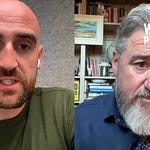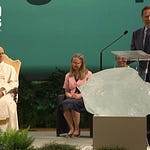Saving Ourselves: Can People Power Save the Planet?
In this Wicked Problems – Climate Tech Conversations, we had the privilege of sitting down with one of the world’s most prominent social scientists working on climate issues: Professor Dana R. Fisher, author of Saving Ourselves, a groundbreaking exploration of the intersection of activism, systemic failure, and climate resilience. Fisher’s insights are as sobering as they are hopeful—if you can keep your nerve without giving in to delusion or despair. If you haven’t already listened, you’re missing one of the most important conversations we’ve had this year.
The Apocalyptic Optimist
Professor Fisher describes herself as an “apocalyptic optimist.” She doesn’t shy away from the dire realities of climate change, but she’s equally determined to focus on solutions—not the ones handed down by governments or dictated by markets, but the grassroots power of people.
Her core message: systemic change will not come from the state or the market alone. Both institutions have demonstrated, time and again, their failure to rise to the challenge. Instead, Fisher argues, the solution lies in "people power": organized, community-driven activism that can push for systemic change.
This isn’t just theoretical. Fisher has spent her career studying social movements, activism, and the ways people mobilise in the face of crises. She’s clear-eyed about the obstacles but steadfast in her belief that collective action can force the changes we need. But in her theory of change, things will need to get a lot darker still before real change is possible.
Why Climate Shocks Matter
One of the most striking parts of the conversation was Fisher’s argument that personal experience of climate shocks—wildfires, floods, hurricanes—is often the most effective catalyst for mobilization. “It’s the personal experience of a climate disaster that gets people off their couches and into the streets,” she explained.
But this presents its own challenges. As Fisher noted, even in the wake of devastating events like Hurricanes Helene and Milton, misinformation and conspiracy theories can fill the void, undermining trust in both science and government. FEMA workers, for example, were driven out of North Carolina by armed groups who believed the storms were government-engineered. Fisher’s takeaway? If we don’t meet communities where they are—both physically and relationally—we lose the chance to build the trust needed for collective action.
The Anthro Shift: Why Progress Swings Backwards
Fisher also revisited her 2019 theory of the “Anthro Shift,” which explains how societies swing between progress and regression on environmental issues. She points out that change is not linear. While moments of risk and crisis can push societies toward collaboration between the state, market, and civil society, those same moments can just as easily lead to regression, polarization, or even authoritarianism.
COVID-19, for example, initially prompted unprecedented collective action, with governments and communities working to “flatten the curve.” But as fear subsided, societies snapped back to the status quo, highlighting the fragility of collective efforts. Similarly, Fisher warns that the same could happen with climate action if we fail to sustain momentum.
Recommendations to Save Ourselves
As the conversation turned toward solutions, Fisher outlined three critical recommendations from her book’s fifth chapter:
Invest in Community Resilience: Fisher is adamant that resilience must be built at the community level, where people live, work, and experience climate shocks. Parachuting in outsiders to help—whether activists or FEMA workers—won’t cut it. We need local leaders and networks who are trusted by their neighbors.
Capitalise on Moral Shocks: Drawing on lessons from the civil rights and suffrage movements, Fisher emphasizes the power of moral outrage. Moments of injustice or crisis, when framed effectively, can galvanize widespread support. But timing is everything; we must act quickly to connect these moments to systemic change.
Prepare for Repression: Fisher warned that as activism ramps up, so too will repression. It’s a provocative concept. But not one unfamiliar to MLK and SNCC when deciding to walk across the Edmund Pettus Bridge in Selma.
Dana’s Catalysts
Professor Fisher highlighted several key catalysts that have shaped her worldview and approach to climate activism:
Rebecca Solnit’s Hope In The Dark: Untold Histories, Wild Possibilities
Hajar Yazdiha’s The Struggle for the People’s King: How Politics Transforms the Memory of the Civil Rights Movement
Touch Grass: “taking my kids, getting them away from their devices and outside. Somewhere where they don't have a signal or just without their phones and walking and hiking and biking, cross country skiing or whatever, getting out in the woods, in the world and experiencing the beauty that reminds us why we all need to work together to save ourselves because it's not just about us and there's so much be hopeful about”.
To dive deeper into Fisher’s work, check out her book Saving Ourselves, available online and in bookstores. You can also connect with her on LinkedIn and BlueSky.
The Bigger Picture
Fisher’s insights go beyond activism. They’re a call to reimagine how we approach the climate crisis. It’s not enough to rely on market solutions or government policies that often fall short. And it’s not enough to wait for disasters to “wake people up.” We need proactive, sustained efforts that engage people where they are, both geographically and emotionally.
Her critique of the left’s lack of investment in long-term infrastructure was particularly compelling. Unlike the right, which has built decades-long networks to support its agenda, the left has often treated activists and organizers as disposable. If we’re serious about systemic change, this has to change too.
Further Reading, Watching, Listening
This conversation isn’t just for activists. It’s for anyone who feels overwhelmed by the scale of the climate crisis and wonders what they can do. Fisher’s message is clear: we’re not powerless. But saving ourselves will require honesty, courage, and a willingness to rethink how we organize and act.
As we head into 2025, Fisher’s insights are more urgent than ever. Climate shocks are increasing. Political polarization is deepening. And yet, the opportunities for change are still within reach. If you’re looking for hope—realistic, grounded hope—this episode is for you.
Join the Conversation
Listen to the full episode with Professor Dana R. Fisher on Wicked Problems – Climate Tech Conversations. Then share your thoughts. What stood out to you? What gives you hope? And most importantly, what will you do to help save ourselves?
Let’s keep the conversation going. You can find us on WickedProblems.Earth and wherever you get your podcasts. And don’t forget to subscribe, rate, and share.
And be part of our 100th Episode!














